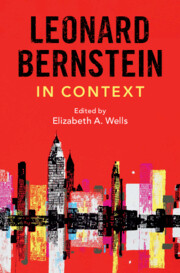Book contents
- Leonard Bernstein in Context
- Composers in Context
- Leonard Bernstein in Context
- Copyright page
- Contents
- Illustrations
- Musical Examples
- Contributors
- Preface
- Part I Bernstein’s World
- Part II Conducting
- Part III Composition, Creation, and Reception
- Chapter 11 The Crisis of Faith
- Chapter 12 Popular Music
- Chapter 13 American Sound
- Chapter 14 Exotic Evocations
- Chapter 15 Opera
- Chapter 16 Women, Gender, and Sexuality
- Chapter 17 Film
- Chapter 18 Early Shows
- Chapter 19 Late Shows
- Part IV Bernstein as Musical and Cultural Ambassador
- Part V Connections
- Part VI The Legacy
- Further Reading
- Index
Chapter 17 - Film
from Part III - Composition, Creation, and Reception
Published online by Cambridge University Press: 06 April 2024
- Leonard Bernstein in Context
- Composers in Context
- Leonard Bernstein in Context
- Copyright page
- Contents
- Illustrations
- Musical Examples
- Contributors
- Preface
- Part I Bernstein’s World
- Part II Conducting
- Part III Composition, Creation, and Reception
- Chapter 11 The Crisis of Faith
- Chapter 12 Popular Music
- Chapter 13 American Sound
- Chapter 14 Exotic Evocations
- Chapter 15 Opera
- Chapter 16 Women, Gender, and Sexuality
- Chapter 17 Film
- Chapter 18 Early Shows
- Chapter 19 Late Shows
- Part IV Bernstein as Musical and Cultural Ambassador
- Part V Connections
- Part VI The Legacy
- Further Reading
- Index
Summary
On the Waterfront (1954) offers a particularly interesting case study of both film and music in the 1950s. Elia Kazan’s iconic depiction of waterfront corruption in Hoboken, New Jersey is revered for its neorealist cinematic techniques, masterclass in method acting, and concern for the collective plight of blue-collar longshoremen, but is perhaps best remembered as a classic story of one man’s tragic fall and ultimate redemption through the love of a woman. Concerned that the film lacked sufficient ‘star power’ for success at the box office, independent film producer Sam Spiegel eventually convinced Leonard Bernstein to compose what would be his first and only film score. This chapter argues that Bernstein’s music interacts with the film’s narrative in a way that is not only remarkable for one’s first score, but also represents an important contribution to 1950s cinema, employing textures and influencing composers who are still with us today.
- Type
- Chapter
- Information
- Leonard Bernstein in Context , pp. 140 - 148Publisher: Cambridge University PressPrint publication year: 2024

